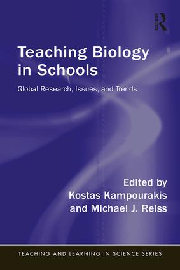Teaching Biology in Schools

Kostas Kampourakis and Michael J. Reiss (Eds)
Routledge, £31.99
Years ago, biology as a subject taught in schools could be neatly divided into botany and zoology. But since the middle of the last century, we have seen an explosion in the number of different facets to the subject. A teacher of biology may well have a degree in biochemistry, for example, and so have only have a rudimentary knowledge base for other areas of the subject, such as ecology. This is reflected in the number of separate chapters within Teaching Biology in Schools, a resource aimed at teachers, educators and anyone tasked with teaching biological concepts to school age students. Chapters cover subjects such as molecular biology, genetics, ecology, and biotechnology, written by expert educators from each field using up-to-date pedagogical research.
One of the main questions in the teaching of biology now is how much should be taught as autonomous units and how one integrates these into the whole subject. Teaching Biology covers this and other issues that cut across curricula and topics, such as learning environments, worldviews, biological literacy, and the nature of scientific inquiry and explanation. The last few chapters are concerned with the development of a scientific mindset in students so that they are able to describe, explain and argue points of view within the subject, not only within the context of their teaching group, but to wider audiences as well.
One of the most useful features of this book is the highlighting of common misconceptions that students have and that teachers should be aware of in their teaching.
Anyone who teaches biology and takes this book off the shelf will find it informative and instructive in all areas and levels of the biology curriculum. It will appeal to recently qualified teachers as well as those with years of experience.
Dr Leighton Dann


